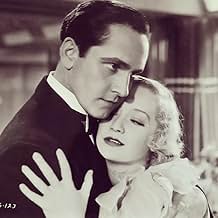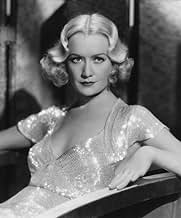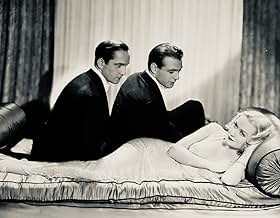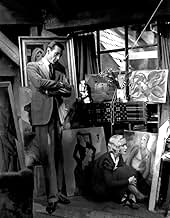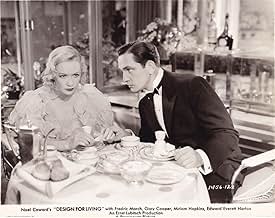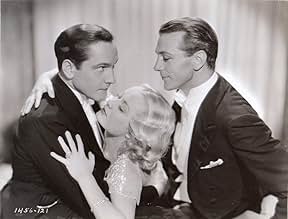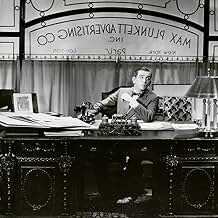IMDb RATING
7.4/10
8.3K
YOUR RATING
A woman cannot decide between two men who love her, and the trio agree to try living together in a platonic friendly relationship.A woman cannot decide between two men who love her, and the trio agree to try living together in a platonic friendly relationship.A woman cannot decide between two men who love her, and the trio agree to try living together in a platonic friendly relationship.
- Director
- Writers
- Stars
- Awards
- 3 wins total
Cosmo Kyrle Bellew
- Man
- (uncredited)
Lionel Belmore
- Theatre Patron
- (uncredited)
Thomas Braidon
- Douglas' Second Manager
- (uncredited)
Nora Cecil
- Tom's Secretary
- (uncredited)
Emile Chautard
- Train Conductor
- (uncredited)
Mathilde Comont
- Heavy Woman
- (uncredited)
Adrienne D'Ambricourt
- Cafe Proprietress
- (uncredited)
James Donlan
- Fat Man with Ring
- (uncredited)
Harry Dunkinson
- Mr. Egelbauer
- (uncredited)
Estelle Etterre
- Woman in audience
- (uncredited)
- Director
- Writers
- All cast & crew
- Production, box office & more at IMDbPro
Featured reviews
For me, of course, there would be no choice. A young Gary Cooper - talk about a dream walking.
Noel Coward's "Design for Living" was a play Coward wrote for himself and Lunt and Fontanne to star in, concerning a woman, Gilda, who can't decide between two young men and best friends in love with her, Tom and George.
So the three decide to live together platonically. Tom leaves to work on his play, and while he's away, George and Gilda sleep together. Later on, alone with Tom, she sleeps with him, and George catches them together. Then Gilda makes a decision.
Only one line from the original play was retained for the film. Though it is precode, the sex is inferred. Given the Lubitsch touch, it's a delightful, sexy comedy with pretty Miriam Hopkins as the winsome Gilda, Fredric March as Tom, a playwright, and Gary Cooper as George, an artist.
The three young, attractive actors under Lubitsch's direction really make the film and situation sing.
March was never much for comedy, though he does an okay job. Hopkins was a wonderful actress with many Broadway credits before getting into films, and Cooper was just so darned gorgeous I have no idea how he was except my impression is that he was very good. Had I been Hopkins - no choice! A charming film.
Noel Coward's "Design for Living" was a play Coward wrote for himself and Lunt and Fontanne to star in, concerning a woman, Gilda, who can't decide between two young men and best friends in love with her, Tom and George.
So the three decide to live together platonically. Tom leaves to work on his play, and while he's away, George and Gilda sleep together. Later on, alone with Tom, she sleeps with him, and George catches them together. Then Gilda makes a decision.
Only one line from the original play was retained for the film. Though it is precode, the sex is inferred. Given the Lubitsch touch, it's a delightful, sexy comedy with pretty Miriam Hopkins as the winsome Gilda, Fredric March as Tom, a playwright, and Gary Cooper as George, an artist.
The three young, attractive actors under Lubitsch's direction really make the film and situation sing.
March was never much for comedy, though he does an okay job. Hopkins was a wonderful actress with many Broadway credits before getting into films, and Cooper was just so darned gorgeous I have no idea how he was except my impression is that he was very good. Had I been Hopkins - no choice! A charming film.
In this surprisingly risqué film made before the Hays code, two men and a woman share an apartment in Paris and talk openly about sex. It's fun to watch, thanks to the witty and sophisticated dialog of Noel Coward, the screenplay by Ben Hecht, and of course the masterful direction of Lubitsch. March is wonderful as a struggling playwright. Hopkins has one of her best roles as a free-loving woman who loves two men but marries a third. Lubitsch elicits a fine comedic performance from Cooper as a hot-tempered artist. In a typical role, Horton plays a stuffed shirt. There's no music, which could make things seem static, but Lubitsch keeps it moving at a breezy pace.
This was one of the movies I was so sure was going to be stupid and annoying but it turned out to be such fine comedy I've already watched it three times in the past week or two. So many good lines. Tom writes a play called Goodnight Bassington - a comedy in about three acts with a tragic ending. George paints Lady Godiva on a bicycle, despite the fact that a bicycle seat IS a little hard on her historical background. Gilda says that she went to see the above-mentioned painting of Lady Godiva with a friend. "She loved it. We haven't spoken since," Gilda tells George, who begins to pout. He does a fair amount of pouting throughout the film.
Eaglebauer also makes for some fine humour in some scenes near the end, but we never get to see the man. We only hear him bellowing out a joyous song about "falling leaves and fading trees! Goodbye, summer, goodbye!"
But besides all that this really wacky movie is a delight and I sure wish they'd re-release it because it's so good.
So. There's only one thing I have to say to you. Immorality may be fun, but it's not fun enough to replace one hundred per cent virtue and three square meals a day.
Eaglebauer also makes for some fine humour in some scenes near the end, but we never get to see the man. We only hear him bellowing out a joyous song about "falling leaves and fading trees! Goodbye, summer, goodbye!"
But besides all that this really wacky movie is a delight and I sure wish they'd re-release it because it's so good.
So. There's only one thing I have to say to you. Immorality may be fun, but it's not fun enough to replace one hundred per cent virtue and three square meals a day.
10reelguy2
Miriam Hopkins finds herself in love with both Gary Cooper and Fredric March (who can blame her?), so she does what any sensible Pre-Code woman would do: she decides to live with both of them!
It's a tribute to movie audiences of the early 1930s that a sophisticated comedy like Design for Living could a.) Get produced, and b.) Be a success at the box office. The dumbing down of current films means that the delicious innuendo in Design for Living would go over the head of most of today's audience.
The key to the Lubitsch Touch was in the perfect timing of physical gestures and the delivery of the lines. Trouble in Paradise and Design for Living were the best in this respect. Personally, I prefer the lack of music in Design for Living. I think it dates the film less than Lubitsch's other efforts.
I don't mind that Ben Hecht wrote most of the film's dialog rather than Noel Coward, who wrote the original play. All I know is that the dialog is very very funny and quite naughty, making this the ultimate Pre-Code film.
Miriam Hopkins could do no wrong in a Lubitsch film, and her work here is brilliant. She's intelligent and uncompromisingly honest. Her leading men, Gary Cooper and Fredric March, are both sexy and hilarious. Gary Cooper is a particular revelation, displaying a flair for comedy that is quite unexpected. As Cooper's friend and rival for the affection of Hopkins, March is also very funny, which comes as no surprise after his brilliant parody of John Barrymore in The Royal Family of Broadway (1930).
Prepare to laugh yourself silly during what may be the funniest film ever made.
It's a tribute to movie audiences of the early 1930s that a sophisticated comedy like Design for Living could a.) Get produced, and b.) Be a success at the box office. The dumbing down of current films means that the delicious innuendo in Design for Living would go over the head of most of today's audience.
The key to the Lubitsch Touch was in the perfect timing of physical gestures and the delivery of the lines. Trouble in Paradise and Design for Living were the best in this respect. Personally, I prefer the lack of music in Design for Living. I think it dates the film less than Lubitsch's other efforts.
I don't mind that Ben Hecht wrote most of the film's dialog rather than Noel Coward, who wrote the original play. All I know is that the dialog is very very funny and quite naughty, making this the ultimate Pre-Code film.
Miriam Hopkins could do no wrong in a Lubitsch film, and her work here is brilliant. She's intelligent and uncompromisingly honest. Her leading men, Gary Cooper and Fredric March, are both sexy and hilarious. Gary Cooper is a particular revelation, displaying a flair for comedy that is quite unexpected. As Cooper's friend and rival for the affection of Hopkins, March is also very funny, which comes as no surprise after his brilliant parody of John Barrymore in The Royal Family of Broadway (1930).
Prepare to laugh yourself silly during what may be the funniest film ever made.
Intelligent script, witty dialogue, sexy stars, sophisticated story, deft direction…What more can I say? It's Lubitsch and Paramount at its Pre-Code best! This was another of those "vintage" films of which you had the chance of reading a lot about, but before Universal released "The Gary Cooper Collection", where it's included, you had nowhere to watch it. Of course, I bought promptly the aforementioned set.
The picture tells the story of free-spirited Gilda Farrell, a young lady who works at a Parisian Advertising Agency, managed by that great seasoned pro, Edward Everett Horton, who by chance meets on board a train, struggling, penniless, artists George Curtis, a painter (Gary Cooper) and Thomas Chambers, a playwright (Fredric March), in which may be one of the most "risqué" plots of all the Pre-Code Era, dealing openly with the pros and cons of a mènage-a-trois.
Miriam Hopkins portrays the deliciously mischievous Gilda, giving a top, tongue-in-cheek performance, looking absolutely beautiful and full of glow from within; it's really in her films directed by Lubitsch that her appeal shines at its most and she looks at her attractive-best.
Fredric March is good too as the "more down-to-earth-but-nevertheless-madly-in-love" playwright, who lives with buddy Gary Cooper in a miserable tenement, until Miriam Hopkins comes in scene and to "the rescue".
But the revelation, in my opinion, is Gary Cooper; after seeing him in many of his 1930s films, I feel that I like him best in the variety of roles he got to play in those years: a young idealist in "Peter Ibbetson", a sensitive soldier in "A Farewell to Arms", a sophisticated artist in this one, etc. He really was a good actor from the beginning of his "talkies" career (I haven't seen his Silents, so I cannot give an opinion), showing much skill and depth in his interpretations. In this film he plays excellently opposite such strong talents as Miriam Hopkins and Fredric March, absolutely "a la par".
In all, a highly enjoyable film. Smart Entertainment. A must.
The picture tells the story of free-spirited Gilda Farrell, a young lady who works at a Parisian Advertising Agency, managed by that great seasoned pro, Edward Everett Horton, who by chance meets on board a train, struggling, penniless, artists George Curtis, a painter (Gary Cooper) and Thomas Chambers, a playwright (Fredric March), in which may be one of the most "risqué" plots of all the Pre-Code Era, dealing openly with the pros and cons of a mènage-a-trois.
Miriam Hopkins portrays the deliciously mischievous Gilda, giving a top, tongue-in-cheek performance, looking absolutely beautiful and full of glow from within; it's really in her films directed by Lubitsch that her appeal shines at its most and she looks at her attractive-best.
Fredric March is good too as the "more down-to-earth-but-nevertheless-madly-in-love" playwright, who lives with buddy Gary Cooper in a miserable tenement, until Miriam Hopkins comes in scene and to "the rescue".
But the revelation, in my opinion, is Gary Cooper; after seeing him in many of his 1930s films, I feel that I like him best in the variety of roles he got to play in those years: a young idealist in "Peter Ibbetson", a sensitive soldier in "A Farewell to Arms", a sophisticated artist in this one, etc. He really was a good actor from the beginning of his "talkies" career (I haven't seen his Silents, so I cannot give an opinion), showing much skill and depth in his interpretations. In this film he plays excellently opposite such strong talents as Miriam Hopkins and Fredric March, absolutely "a la par".
In all, a highly enjoyable film. Smart Entertainment. A must.
Did you know
- TriviaConsiderable censorship difficulties arose because of sexual discussions and innuendos, although the Hays Office eventually approved the film for release. However, the film was banned by the Legion of Decency and was refused a certificate for re-release by censor Joseph Breen in 1934 when the Production Code was more rigorously enforced.
- GoofsCamera shadow visible on window frame as Gilda sets the table.
- Quotes
Max Plunkett: Immorality may be fun, but it isn't fun enough to take the place of one hundred percent virtue and three square meals a day.
- ConnectionsFeatured in Complicated Women (2003)
- SoundtracksThe Star Spangled Banner
(1814) (uncredited)
Music by John Stafford Smith
Hummed by Gary Cooper and Fredric March
Details
- Release date
- Country of origin
- Languages
- Also known as
- Una mujer para dos
- Filming locations
- Production company
- See more company credits at IMDbPro
Box office
- Gross worldwide
- $157
- Runtime1 hour 31 minutes
- Color
- Aspect ratio
- 1.33 : 1
Contribute to this page
Suggest an edit or add missing content



